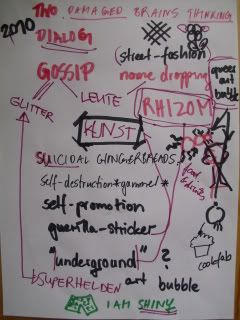What would Bill Hicks say if he were alive today? Bloody murder? Or would he put his head under water – if we gonna get all pruny, then at least evenly?
In face of it all Jon Stewart and Stephen Colbert are going to RALLY TO RESTORE SANITY AND/OR FEAR next weekend in Washington. In face of Germany's own autumn of discontent – the Leitkultur-debate is making its reappearance (aka how to keep the 'German' in German angst) – Christine Lemke-Matwey called out to Germany's own Dichter/Denker to get their heads out of the
Living abroad in 2008, I was pondering upon that German angst myself and wrote about Schlingensief's WIEN-AKTION (BITTE LIEBT ÖSTERREICH), his 2000 Austrian take on this season's debate:
// Is this real? Is it real theater? Real art? Or indeed real life? For those who witnessed Schlingensief's work BITTE LIEBT ÖSTERREICH commissioned for the Wiener Festwochen festival in Austria, it was in fact difficult to decide upon the nature of the spectacle: the work featured a large container installed on a square next to the opera house in Vienna. In line with the concept of the Big Brother TV program, twelve participants, who were announced by Schlingensief as seeking for asylum, moved into the container for one week, being under video surveillance on a 24 hours basis. The public could follow the life of the container inhabitants on television and the Internet and were asked to vote for the candidates, whereby those two receiving the most votes would not only definitely have to leave the container, but also putatively have to leave the country, having lost the competition of seeking for refugee. Whereas this account frames the work as a rather straightforward piece of performance art, the introduction of elements such as a banner stating 'Ausländer Raus' ('Foreigners Out'), a slogan used by neo-nationalist parties in Germany, and flags alluding to the right-wing populist Austrian party FPÖ rooted the work within the current political discussion, pointing to its potential as being an actual political campaign.
Hence, interpretations of Schlingensief's work indeed ranged from it being a critique of policies towards asylum seekers and the populist strategies used for their implementation to being a meta-critique on the increasing event character of all politics and the crucial role of the media apparatus. Criticism towards the WIEN-AKTION ran on the very same axis: Schlingensief's re-enactment of the spectacle of politics through yet another spectacle turns artistic practice into an act of populist event management, which dismisses art's potential to say something meaningful about reality by turning it into a piece of virtual reality itself.
Yet, within the framework of this exhibition [MARTYRS. CLOWNS. BIOGRAPHICAL EXORCISMS] the term virtual reality seems the least appropriate to describe the nature of Schlingensief's artistic project, which is marked by his ever-lasting possession by the demon called Germany. His works then appear as performances of political introspection which insist on a place for his own biography within, against, towards and in spite of the reality of German history – PLEASE LOVE AUSTRIA is after all a call for subjective engagement. The audience in Vienna reacted to the initial display of the 'Foreigners Out'-banner with applause – Art, life and true romance are never virtual. //
I don't know if Schlingensief would want to participate in the current debate, too. Or if he would feel that you can only state the obvious for so many times. I don't even know if I want to. The fact that to Seehofer and company the Leitkultur-debate is no farce at all (and that they are not asking to Please love Germany either) leaves me a bit breathless. I think I'm already holding my breath under water with Bill. 'Germany', neat and tidy within its lovely 'borders', home of the 'Germans' and their 'Christian-Jewish tradition', reading Grass or better yet, watching TATORT on Sundays. I have no clue.
I am German, yet nothing but a patchwork, my biography a succession of actual physical and/or cultural displacements, migration, refuge, adaptation, weirdness. My grandmother was born in a country that doesn't exist anymore, my parents were, I was. Germany just turned twenty. Or two-hundred, but then again, I have no idea either way. I'm living in Kreuzberg now, where nobody is from here, everybody came from somewhere, including patched baggage.
The only time I ever got a glimpse at what that concept 'Germany' might mean (that icing apart from the actual cake, the Grundgesetz) was when I lived abroad back then in 2008. And then I only realised it in the way other people looked at me and told me, that yes, I am German, even if in denial. And in the way the Germans at the Goethe-Institute in Amsterdam explained it to my fellow Dutchmen. I listened to Feridun Zaimoglu talking about GERMAN AMOK, I read Christian Kracht's FASERLAND, I found Schlingensief in a dark room at the De Appel gallery. I even enjoyed the familiarity of their geographies, Heimat. But then again, they looked a lot like Kreuzberg.
So I have an idea after all. Last week I asked for political and cultural asylum again nevertheless. Not that I'm headed for greener pastures (see above). Just pastures. If L.A. has fallen into the ocean by then, I'll be heading out to ARIZONA BAY.

No comments:
Post a Comment